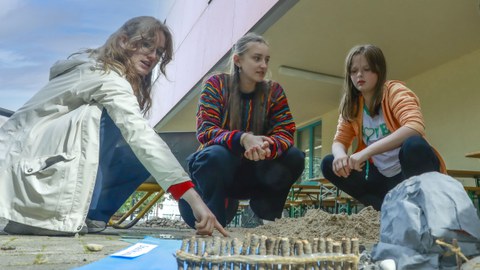Jun 18, 2024
Practical experience for student teachers and fewer missed lessons for pupils - successful pilot project in Upper Lusatia

Project work: Building a model of coastal formations from sand and other natural materials at the Richard-von-Schlieben secondary school in Zittau.
The first phase of a pilot project for student teachers ends with the start of the summer vacations. In May and June, they accompanied pupils learning at two secondary schools in Zittau and Weißwasser. For six weeks, the 14 trainee teachers were able to gain practical experience in this new format on Fridays and also reduce the number of lessons missed on site. TU Dresden is planning the second phase of the pilot project for the coming school year.
The results of the past few weeks are promising: in a "class team", four students each supported a school class for a whole day the so-called learning office and with reading support. This gave them the opportunity to gain practical experience before their traineeship. Student teacher Marla Arndt is delighted with this opportunity: "Unlike the block internship, where we mainly sit in on lessons, here we can work directly with the children."
The principal of the Richard von Schlieben Secondary School in Zittau is more than satisfied: "The lack of lessons presents us with major challenges. It was a heartfelt wish that this project would be implemented." This is the view of many of those responsible in the region and they welcome the continuation of the project in the 2024/25 school year. 14 schools in other cities, including Görlitz, Großschönau, Mückau and Niesky, also want to take part in the second pilot phase. On site, the schools support the students with mentors and the municipalities offer free accommodation.
The children are also happy about the learning support provided by the students, because "otherwise you have to do so much revision. That's stupid," is how pupil Hailie sums it up.
The first six-week pilot phase was primarily aimed at testing the concrete conditions for a successful practical phase. Anke Langner, Chair of Education / Inclusive Education at TU Dresden, sees this as confirmation: "The project has been well received by both the students and the schools. The semester-long internship offers junior teachers the opportunity to continuously reflect on the theory they have learned at university in practice at school. They can then incorporate this experience into seminars and lectures, not only in educational science, and it is precisely this early link between theory and practice that allows them to grow into the teaching profession early on in their studies." As the initiator of the project, Prof. Anke Langner draws on experience from the Dresden University School for the conception and implementation. The semester-accompanying internship has already been implemented here since the 2023/24 school year.
For student Olivia Tatarek, this is the right approach. She would like to have such an opportunity right from the start of her studies: "An internship every semester would be nice. That way, you can get to grips with everyday school life as a student." And her fellow student Anna Dietze adds: "For me, it's an opportunity to gain experience. And we are also paid quite well." In addition to being credited as a course achievement – as part of a compulsory internship or as additional practical experience with credit in the supplementary area – the hours worked are also to be remunerated on a pro rata basis.
Student teachers at TU Dresden can already register for the planned semester-accompanying school internship in the 2024/25 school year. The new internship format will then be accompanied by a series of seminars and regular collegial case consultations – an ideal combination of part-time job and qualification.
Further information can be found at
https://tu-dresden.de/gsw/ew/iew/ewib/studium/theorie-praxis-verzahnung
Contact
Prof. Anke Langner
Phone: +49 351 463-32235
From the start of the 2024/25 school year, student teachers at TU Dresden will be able to gain continuous practical experience at an early stage, reflect on it under supervision, and learn to combine it with theory. This is made possible by a modified internship structure and close cooperation between TU Dresden and the internship schools – even in higher semesters. The idea is not to replace missing teachers or teach regular lessons. Instead, students should facilitate additional activities for smaller learning groups that encourage and support pupils in their learning and for which there is hardly any time in normal subject teaching. These include, for example, reading support, project work or independent work in so-called learning offices. The first pilot phase of the Alternative internship (ALSO) was run by the German Center for Astrophysics (DZA) in Görlitz.
In the pilot project designed to also counteract the loss of lessons in East Saxony, the students benefit from their experiences gained during the internship alongside the semester at Dresden University School. Prof. Anke Langner is continuously developing this approach in collaboration with the schools and students to improve the connection between theory and practice early on in their studies.
